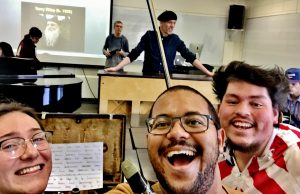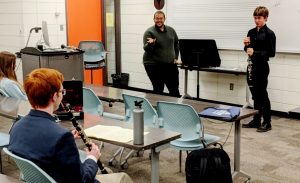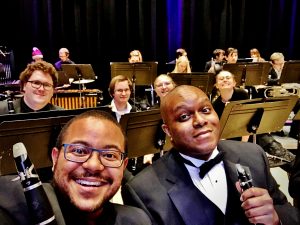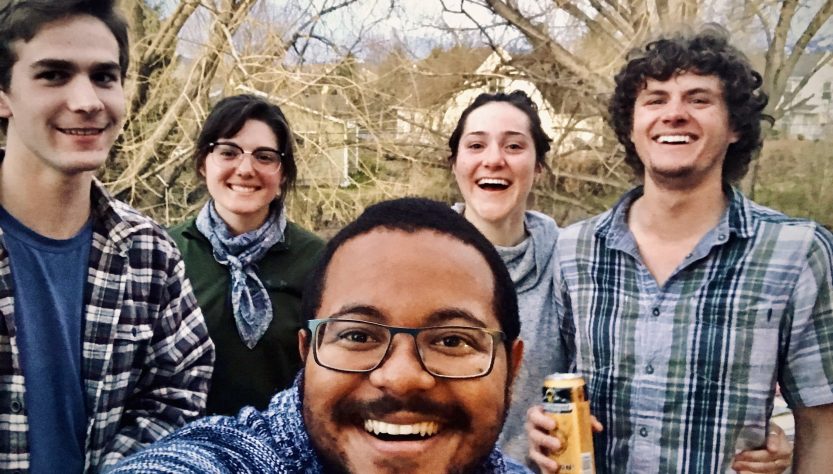Féroll-Jon Davids
MMus in Performance (Clarinet)
Spring 2020 semester exchange: Montana State University (MSU), Bozeman, Montana, USA
PRE-DEPARTURE
During my undergraduate music studies, I had the privilege of attending a semester exchange in the USA. It was that experience that enticed me into wanting to acquire additional and even more diverse musical experiences and academic knowledge during my current postgraduate studies. Consequently, for the period of January to May 2020, Montana State University (MSU) in Bozeman, Montana, USA, became my temporary home. After selecting MSU so that I could benefit from the tutelage of clarinet professor Dr Gregory Young, I quickly had to get my ducks in a row.
Fortunately, my former exchange gave me an advantage in respect of the administrative arrangements and collating the required documents for MSU which went much smoother and was less complicated. For example, because I had done a gamut of vaccinations for my last exchange, I was only obliged to submit an updated TB Skin Test this time around, which I had done for approximately R180 at PathCare. Once MSU had received all my required information, they mailed me my DS-2019, a form declaring one’s eligibility for the academic exchange and a crucial document required for the visa application and traveling to the USA.
I started my online application for the J-1 Non-immigrant Visa by filling in the DS-160 application form at https://ceac.state.gov/genniv/. During 2019, the J-1 visa application fee was R2400, while the accompanying SEVIS fee (Student and Exchange Visitor Programme fee) was R3400 and payable through the following link: https://www.fmjfee.com/i901fee/index.html#. Upon completion of all the forms and payments, I was provided with a succinct checklist of all the things I would need for the interview at the US Consulate in Cape Town. It was a speedy process and after two days my passport containing the visa was returned to me! Neelsie Travel assisted me in finding the most effective and economic way of reaching my final destination.
Students who wish to embark on a semester exchange should be cognisant of the enormity of the administrative load and financial expenditure during the pre-departure phase, for example application fees (visa), medical requirements (mandatory immunisations), flight tickets, travel insurance and accommodation (for overnight layovers). Furthermore, I highly recommend that prospective exchange students utilise the services and guidance that Stellenbosch University provides during their whole exchange experience.
While it is easy to get overwhelmed and despondent during the pre-departure period owing to the sheer amount of paperwork, there is a way around this. What worked for me was a productivity tool called a to-do list. At the time, I created separate lists that dealt with specific obligations: MSU Documentation, SU Documentation, Visa Application, Transportation (Flight & Ground) and Accommodation. I would also urge prospective exchange students to digitalise hard copy documents and upload them to an online storage space such as Google Drive, OneDrive, Dropbox or iCloud. When your official journey commences, having important documents on hand digitally makes your journey much easier. The major benefit of setting up to-do lists and up-to-date online folders was that my focus on my MMus studies and duties were not tainted by the external administrative stress.
The pre-departure phase is about putting matters in place to ensure that the actual experience is not fraught with stress and mayhem, but rather a time during which one can calmly and purposefully focus on building new relationships and gaining invaluable insights, while simultaneously giving effect to one’s academic and career-related goals.

EXPERIENCE AT THE HOST UNIVERSITY
I am a Masters student specialising in clarinet performance and also completing a thesis component that sets out to document the life of South African pianist-repetiteur Gordon Jephtas. My initial objective of doing a semester exchange at Montana State University during the final year of my Masters degree, was to focus and expand on matters pertaining to my clarinet studies. My initial exchange in 2018 taught me that there is not only one method or way of reaching one’s desired results. The exchange at MSU under the instruction of Dr Young was no different. Besides having learnt valuable teaching philosophies and stylistic approaches from him, I had the opportunity to pass on my own musical knowledge to younger clarinettists, and by so doing becoming more alive to my own educational philosophies. Being on a J-1 visa, one has to be registered for a minimum of 9 credits’ worth of courses. I chose to do Clarinet Pedagogy (2 credits), Applied Lessons (1 credit), Chamber Music (1 credit), Clarinet Ensemble (1 credit), MSU Wind Symphony (1 credit) and Music History: 20th & 21st Century Music (3 credits).
Already before MSU’s Spring Break, it became clear that the effects of the Coronavirus and the measures introduced to curb it would have an effect on our studies. However, much to my surprise, the weeks in isolation, spent in the dormitory while adhering to the Covid-19 restrictions, continued to consist of practicing, thesis work, class attendance and clarinet lessons. The only activities that were cancelled completely were, understandably, all ensemble rehearsals and performances. Of course, everything was converted to some or other virtual platform: Webex, Skype and Microsoft Teams.
The pre-lockdown period was filled to the brim with concerts and memorable events, one such event being the 2020 MSU Clarinet Day that I organised. It took place on 7 March, the weekend before MSU’s lockdown arrangements were implemented. The day consisted of masterclasses by Jon Manasse, Gregory Young, Wendy Bickford and me, seminars on clarinet fundamentals and technique, and closed with a recital featuring all the participants. The day concluded on a high note with visiting Juilliard clarinet professor Jon Manasse performing the Aaron Copland Clarinet Concerto with the Bozeman Symphony Orchestra.
Before the implementation of rigid social distancing, I co-founded the Symbiotic Duo with flautist Megan Makeever-Ali. We had quite a line-up of performance opportunities at prestigious ceremonies and events. As happened with the rest of the entertainment industry, most of our scheduled performances were cancelled. This did not stop us from making music, albeit virtually. A colleague of ours, pianist Thomas Thomas, pioneered an online concert platform – Bozeman Arts Live – for artists in and around the Bozeman area. On this platform, Megan and I had our own individual concerts and included on our programmes the socially distant Symbiotic Duo. The links to these concerts are still accessible to anyone:
Megan Makeever-Ali & Friends: https://www.bozemanarts-live.com/megan-makeever-broadcast & Féroll-Jon Davids: https://www.bozemanarts-live.com/frolljon-davids-broadcast.

Prior to the lockdown of buildings, I attended a number of collaborative recitals hosted by the Music School; I visited the Ellen Theatre and watched the musical ‘Kiss me, Kate!’ and Mendelssohn’s ballet ‘A Midsummer’s Night Dream’; at the Wilson Auditorium, I heard marvellous symphonic repertoire performed by the Bozeman Symphony such as Brahms’ 4th Symphony and Elgar’s Enigma Variations which the orchestra executed with great finesse. Of course, with the dawn of lockdown, Classical performances had to be enjoyed from the comfort of one’s humble abode – mine being my dorm room.
While it is tempting to compare the two partner universities in order to discover what makes each one unique, it is too cumbersome a task to undertake because fundamentally the institutions operate quite differently. During my time at MSU, I attended a class called Music Major Seminar that was mandatory for all students majoring in music. Invariably I walked away from each class, having obtained invaluable information about the music industry from an insider’s perspective. The class, presented by various professionals such as performing artists visiting Bozeman, faculty members and guest speakers, ultimately was a series of varied seminars touching on aspects of music as a career, the industry and other music-related topics. Students were then given the opportunity to engage with the speakers during a Q&A session. It was after a powerful presentation by pianist Jennifer Reason that I realised that such a seminar would greatly augment the music programme at Stellenbosch University. I think it is a fair assertion to make that during one’s university studies one functions in a fairly uniform environment where everyone is in the same boat, until the moment of graduation of course when one realises that one has no certainty about what awaits. In my opinion, a class similar to MSU’s Music Major Seminar would enrich and augment a music student’s expectations and fears of making a life in music.

RETURN TO SOUTH AFRICA/STELLENBOSCH
My return to South Africa from the US was far more nerve-wrecking and histrionic than I could ever have dreamed, upon leaving for MSU in January. While I had intended leaving Bozeman on the last day of class, 8 May, as early as 23 March I was informed by Qatar Airways that they had cancelled my scheduled international flight for 9 May owing to the closure of airports in various countries and the consequent grounding of a large number of airlines. Realising that we were being overtaken by events and after consultation with my family, I bought a new ticket to leave for South Africa from Los Angeles on 27 March. However, United Airlines cancelled that flight the day before I was due to leave because President Ramaphosa had declared a complete lockdown of 21 days starting on 25 March, including the closure of all airports to passenger flights, which would have prevented my flight from landing. I informed South Africa’s Department of International Relations and Cooperation (Dirco) and the SA Consulate in Los Angeles about my situation. Unlike South Africans who were stuck at international airports and found themselves without recourse in foreign countries, I was luckily assured of accommodation and meals as a result of the partnership between SU and MSU. Following a request for assistance by Dr Nell of SU, I was informed by the authorities at MSU that my visa had been extended for two months and that they were negotiating the extension of my accommodation arrangements. I was nevertheless assured by the Consulate in LA that I would be informed if any repatriation flights were scheduled.
While enjoying a spectacular walk on a riverbank in Bozeman on 28 April, my 24th birthday, I received a phone call from the Consulate, informing me about a series of repatriation flights scheduled to leave the USA from 2 May. The following day, when I received the official e-mail, I paid for the repatriation flight by SAA, anticipating to hear on which repatriation flight I had been placed, but that notification never arrived. For the time remaining, I did my final au revoirs and arrived in Washington DC on 1 May. After some transatlantic phone calls and e-mail correspondence with Dirco and the Consulate, I was informed that I had been provisionally placed on the flight on 3 May.
On the morning of 3 May, I arrived at SAA’s desk with some fellow South Africans who were in the same position – having paid for the repatriation flight but not having received an air-ticket. At 15:00, four hours before the departure time, the SAA desk opened. The two people ahead of me in the queue were turned away because their names were not on ‘the list’. Of course, when it was my turn, I stepped forward with great trepidation. My passport was scanned and I was asked how many bags I would be checking in. That immense feeling of relief is not something I shall forget any time soon.
After we disembarked at OR Tambo International Airport in Johannesburg on 4 May at 17:00, we spent a memorable 5 hours in a shuttle on the tarmac, waiting to be escorted to a national quarantine facility where we would remain for two weeks. We all were tested for Covid-19 and are still awaiting our results. My two weeks in quarantine – with regular temperature checks – passed quietly and uneventfully. As the country was still in Level 4 of the lockdown, no air travel was possible. I managed to secure a booking on a bus and eventually arrived in Stellenbosch after a 17-hour drive from Johannesburg. Although I am yet to experience SU under the Covid-19 restrictions, I am positive about the transition, because during my time in the USA, it seemed from there that both South Africa and SU responded extremely stoically and responsibly to the current global pandemic.
While conspiracy theories and predictions of the unknown future are abundant, I align myself with the old adage: Only time will tell. Making plans pertaining to the future is now trickier than usual, but my time abroad was tremendously beneficial to my growth, both as an individual and a musician. If chance permits and I am faced with the prospect of engaging internationally again, I will still find it hard to resist the opportunity.
I would like to extend my sincere and heartfelt thanks to Stellenbosch University and Montana State University, Sarah van der Westhuizen and her team, our Head of Music at SU, Dr Mario Nell, my MSU colleagues and friends, and Dr Gregory Young for sharing with me his expert knowledge. Thank you to everyone for the part you played in augmenting my professional skills and development as an individual. I am immensely grateful and appreciative of your contribution.

